Thanks, Cornelius.
This is the problem:
''It's possible that the Roman-type architectural pillars are more expressive of the pomp and ceremonial glory befitting a modern, twenty-first century Oba of Benin.''
I wonder why architecture from ancient Rome should be seen as more befitting of a modern twenty first century Oba of Benin while architecture from old Benin, which created one of the world's most powerful works of art in relation to its monarchy, may be seen as not so fitting.
That conception is deeply problematic in the light of the grandeur of the Benin artistic imagination across time which projects the monarchy in terms of a magnificent variety of sculptural forms, at various levels of scale.
Is what is at stake simply an issue of differences in ''aesthetics, sense of personal self-esteem/ national pride, self-esteem ,prestige. cultural self-esteem, architectural self- esteem''?
With all due respect to the Oba of Benin, is what is at stake best localised to ''his own personal reasons [ as he acts] on the advice of his advisers and councillors'' requiring one to ''be in his shoes or to be sitting on his throne as HIM, in order to know exactly what he's thinking or the thinking behind the decision-making''?
Is such an approach a demonstration of interpersonal senstivity or a trivialisation of a serious issue or something in between? What may be understood as the frame of reference of the activities of the Oba of Benin and the Benin Traditional Council and other advisers the Oba works with?
My view is that the Obaship and the Oba's palace are an embodiment of Benin culture and need to dramatise the creativity of that culture as much as possible.
The Obaship and the palace are venerable institutions shaped by people existing within the progression of time, implying ideally a balance of continuity and change, ideally innovative change. Does the importation of neo-classical architecture as the central building leading to or housing the Oba's chambers, the central building of the palace, demonstrate any innovation, particularly innovation suggesting the creativity achieved in Benin's world famous arts and its distinctive architecture?
%20ed.jpg?part=0.9&view=1)
The New Front Part of the Central Building of the Palace of the Oba of Benin
from
Alltimepost.com
Benin never had an automobile industry, so one cannot argue for innovation in such an industry, but Benin has an ancient artistic and architectural tradition, one of the greatest in the world. Should the creativity suggested by that achievement not be reflected in the central building of the Oba's palace, the spatial and symbolic centre of Benin culture?
Should the structure be rebuilt? I think so.
Why?
A cultural centre of the level of significance of the palace of the Oba of Benin needs to be constructed in terms of the most enduring values, propjecting the union of the past, the present and the timeless, as demonstrated by the unique insights developed in relation to the culture's creative traditions.
University College, London, for example, has a similar but even more impressive design than the building now constituting the Oba's chambers.
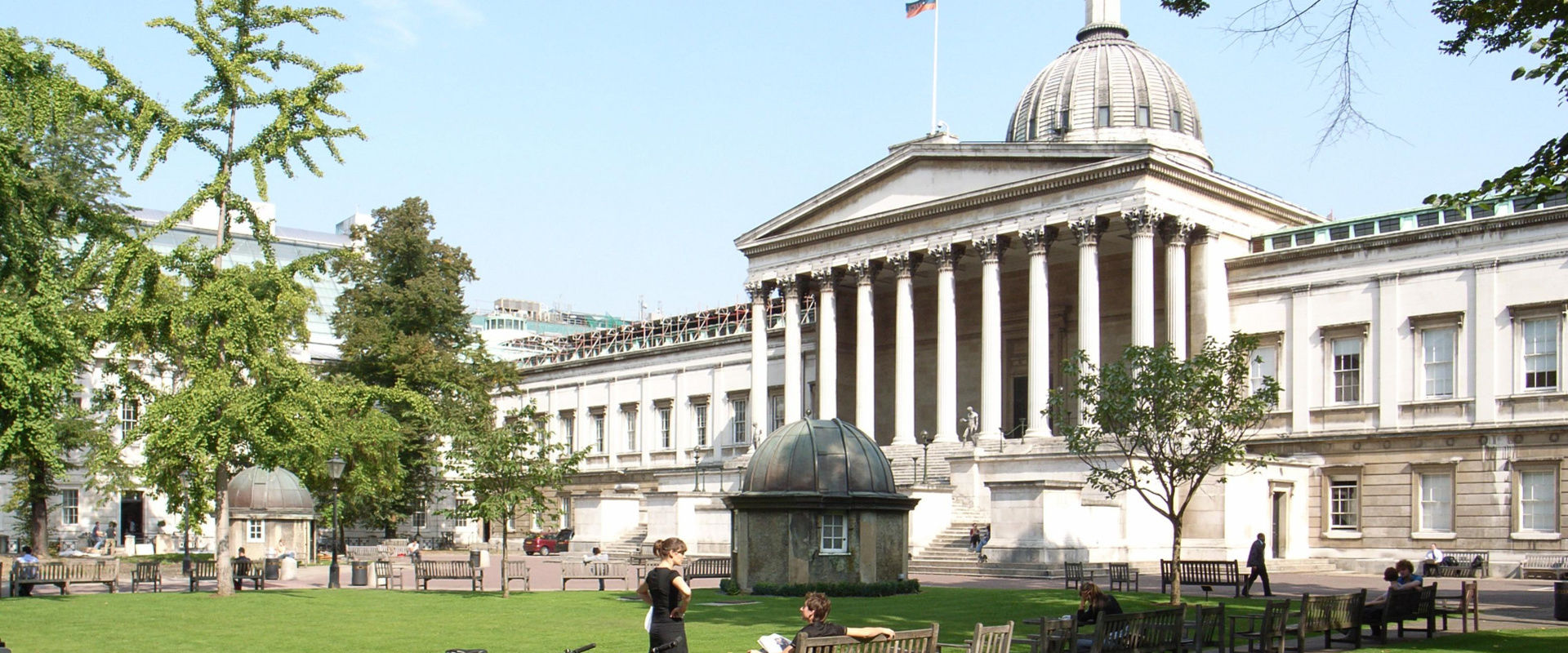
The relevance of that design to UCL, however, is clear, being a Western university with its roots in the headwaters of the Western cognitive tradition in ancient Greece, where that style achieves a particularly iconic representation in the Parthenon.

Jakub Pala's picture of the Parthenon, ''a former temple on the Athenian Acropolis, Greece, that was dedicated to the goddess Athena during the fifth century BC. Its decorative sculptures are considered some of the high points of Greek art, an enduring symbol of Ancient Greece, democracy and Western civilization.(Wikipedia)
What is the direct relationship of such cultural linlks to the palace of the Oba of Benin, the symbolic centre of a civilisation with its own cognitive, artistic and architectural history?
As an example of the innovative use of the idea of pillars in African architecture, pillars demonstrating royal grandeur within high creativity, one may see the famous verandah posts of Olowe of Ise for the palace of the Ogoga of Ikere, in which human figures hold up the roof, the stylization of these figures and the spatial relationships between them greating a sense of silent majesty.
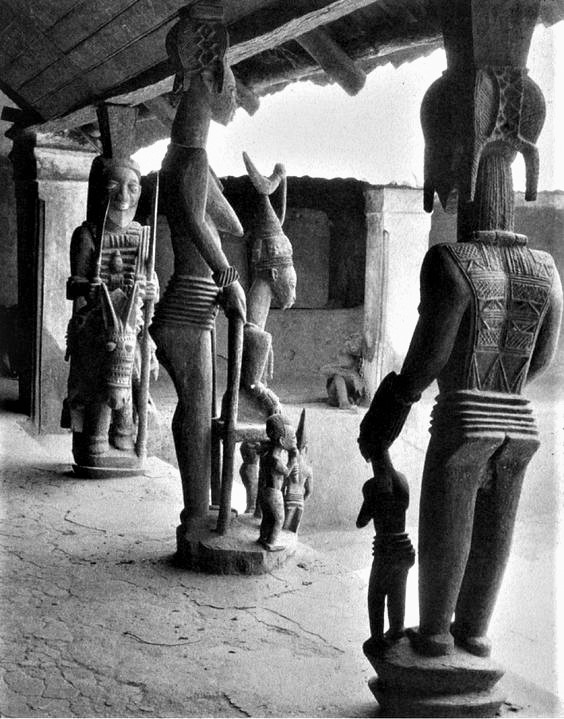
The sculptural tabeleau is centred in the paradoxical figure of the Olowe and his wife, in which the power associated with the monarch is not depicted in terms of an obvious evocation of power on his person, but through a combination of factors, visually powerfully but needing a grounding in Yoruba theologies of kingship to understand.
His wife standing behind him, towers over him,
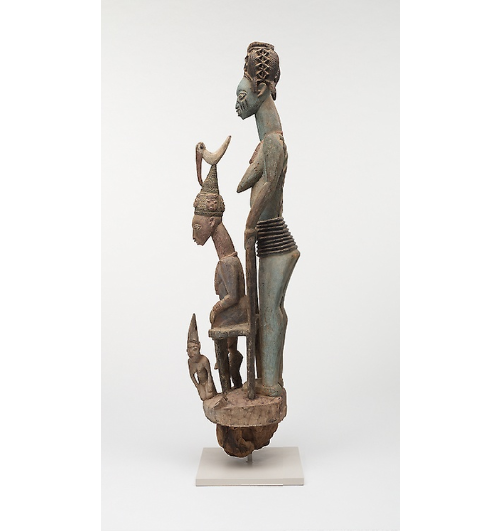
.png?part=0.4&view=1)
her face powerful in its bulbous stare, topped by a crown with a zig zag design akin to a flash of lightning
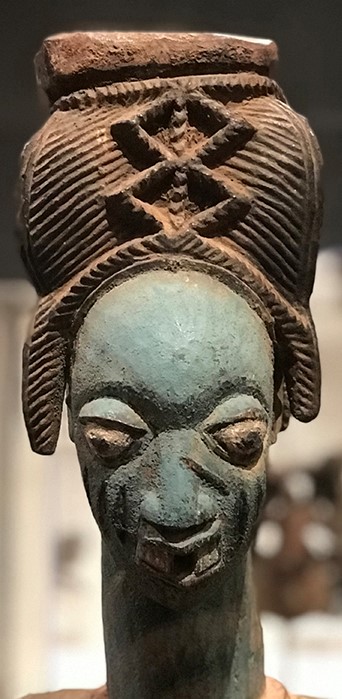
an imposing presence towering above the feminine features of the quietly seated Olowe, his crown, topped by an elegant bird, images suggesting beauty and grace rather than power,
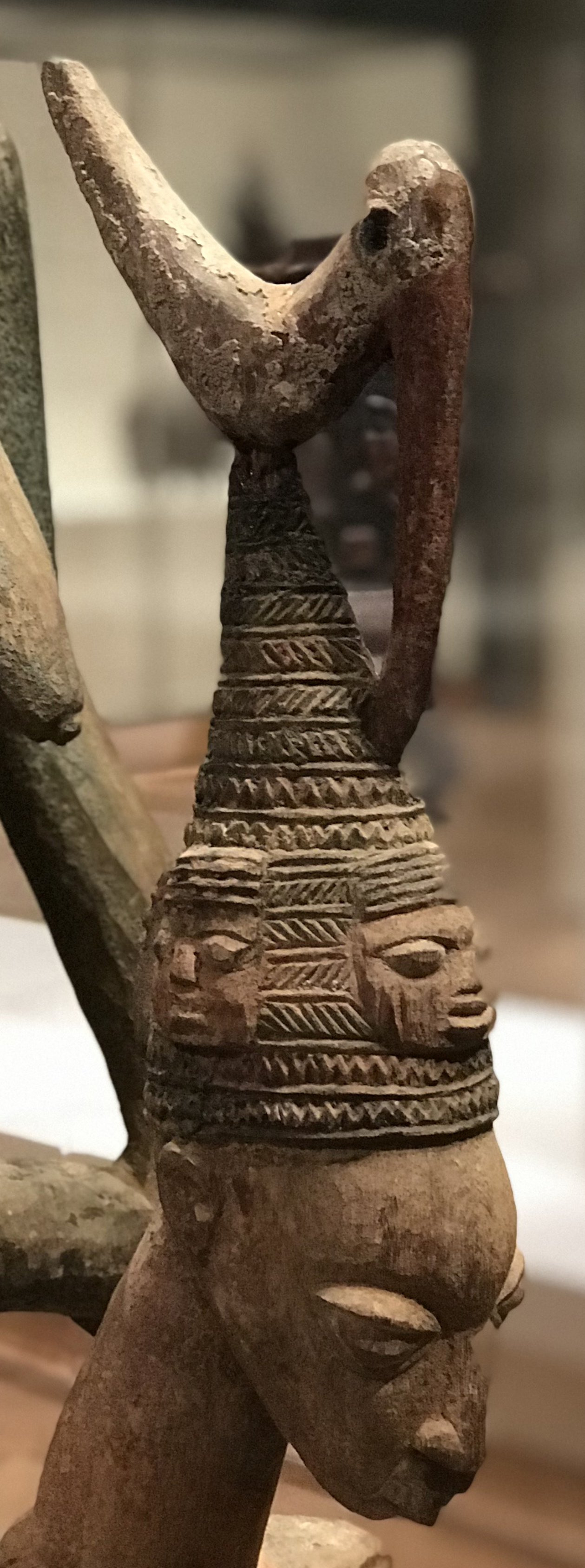
paradoxes possibly evoking Yoruba ideas of royal power as grounded in feminine power, the latter's arcane potency symbolised by the bird, representative of the capacity for interdimensional motion associated with feminine power in its arcane form, evoked by the expression, Awon Iya Wa, which does not simply mean ''Our Mothers'' in the conventional sense of motherhood but creative and destructive potencies embodied by the feminine represented by particular female figures, human and non-human, terrestrial and pre-terrestrial.
Olowe's approach is clearly very different from the European use of human figures as pillars, caryatids and atlantes, the differences between both forms demonstrating the originality of the artists.
It is such originality that should be aspired to by such a cultural centre as the palace of the Oba of Benin.
Related demonstrations of originality could invove comparsions between Olowe's iconic palace doors, such as this one directly below centring an image which looks like an opon ifa, a divination board from the Yoruba origin Ifa system of knowledge, for exploring and shaping possiblities at the intersection of matter and spirit, the face of the embodiment of this intersection and guide to interpreting its symbolic languages, the deity Eshu, inscribed at its sides, as birds converge, their beaks touching, above the divinatory platform, possibly evoking ideas of motion between dimensions and possibilities, as pursued by Ifa
.jpg?part=0.12&view=1)
and other examples of Olowe's unique style
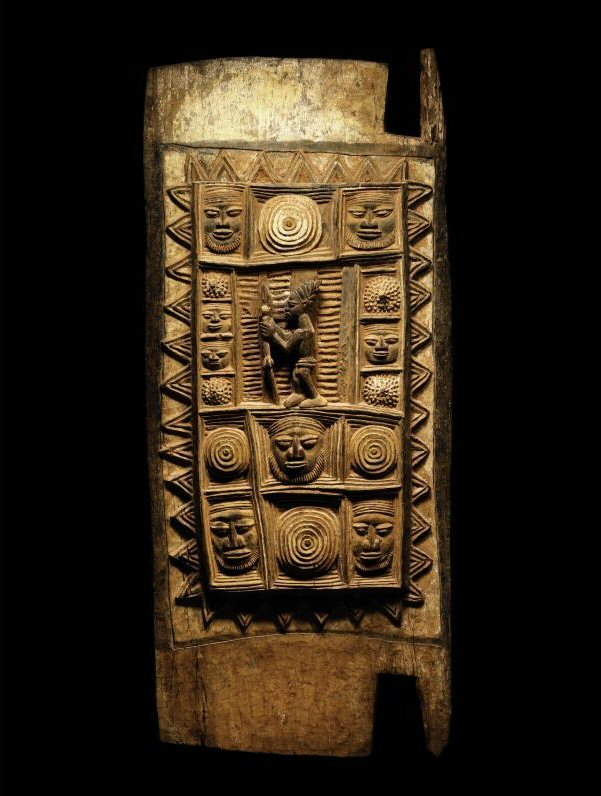
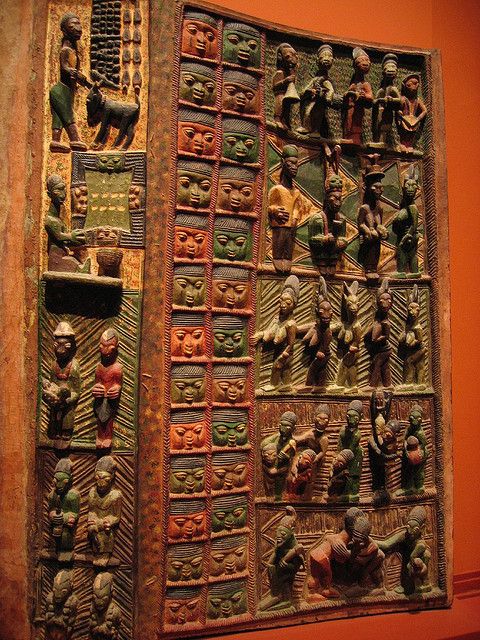
which may be compared, for example, with French sculpture Auguste Rodin's famous Gates of Hell, dramatising scenes of hell in the Divine Comedy of Italian writer Dante Alighieri, topped by a version of Rodin's signature work, the Thinker, a figure crouched in thought, reflecting on the vagaries of human life represented by the varied agonies of hell, each reflecting the character of the life of the person suffering a particular unique punlishment for their own brand of sinful life, as depicted by Dante
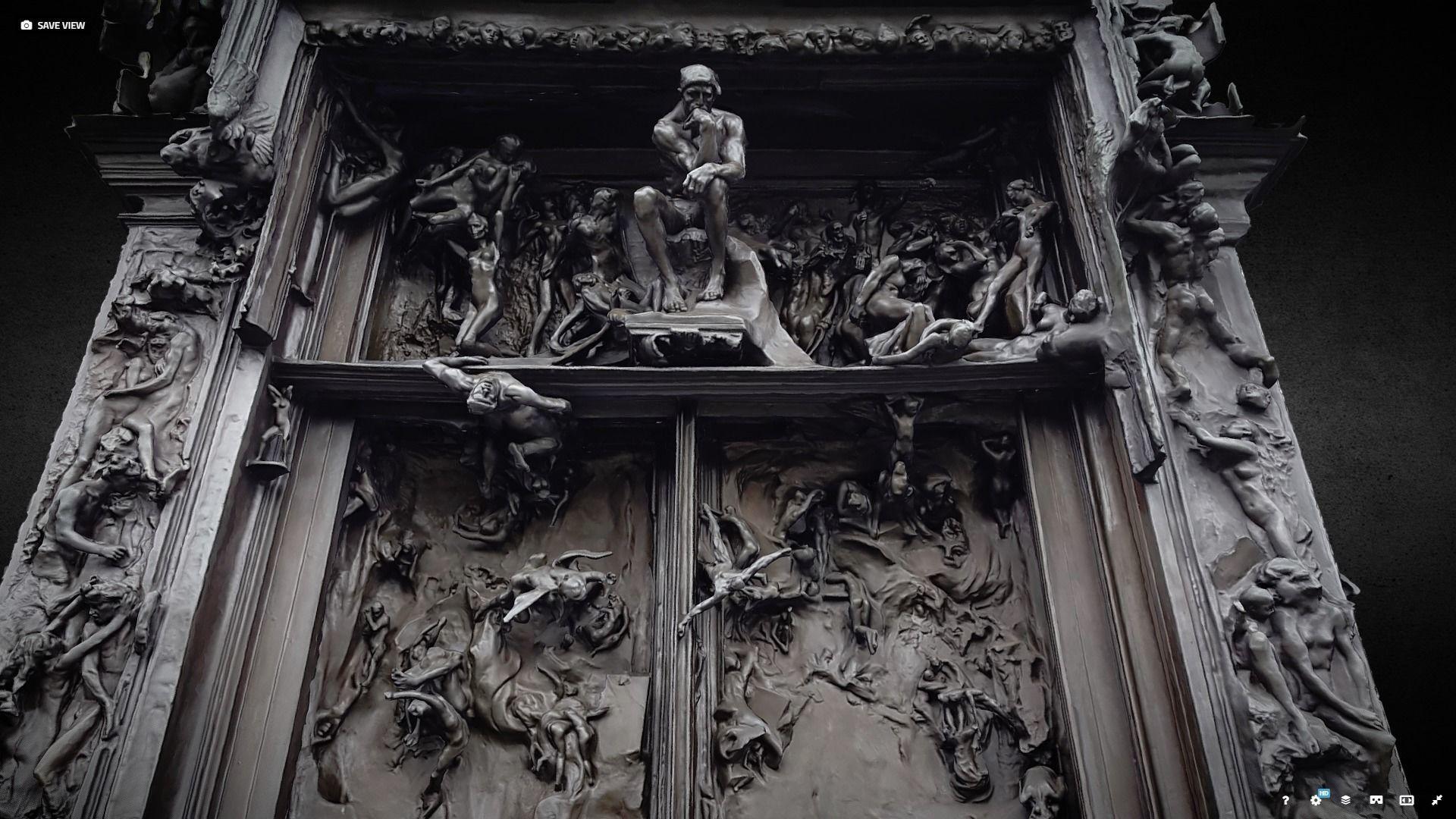
in his poem distilling Western culture from the ancient Greeks and Romans to the poem's time of composition in the medieval period, within a cosmological matrix unifying classical and Christian thought and arts, a continuity of tradition in innovative terms between the Greco-Roman and medieval Western civilisations, represented by Dante's poem and Rodin's 19th and 20th centuries in France that makes my point about the value of innovation in adapting cultural formations, particularly in relation to such a strategic cultural centre as the palace of the Oba of Benin.
thanks
toyin
Dear Oluwatoyin Vincent Adepoju,
"A stitch in time saves nine"
If only you had got wind of the plans that were afoot , you could have forwarded your reservations about the recent renovations and the new features at the Oba's Royal Palace that are not entirely to your liking and perhaps thereby succeed in influencing the final outcome. Now it seems that your objections or regrets are coming too late in the day - or perhaps you expect the pillars to be pulled down and replaced by more glorious local architectures that reflect Benin Culture or maybe even something more up to date designed by David Adjaye ?
After all the hue and cry and all the bad air created about looted Benin Bronzes, some of which I espied on exhibition at the British Museum during the first week of August this year , all I can say is that it's a very poignant point that you make here, poignant and distressful although it need not necessarily be the latter, just because you disagree about someone else's aesthetics, sense of personal self-esteem/ national pride, self-esteem ,prestige. cultural self-esteem, architectural self- esteem
As you are well aware, truth is sometimes stranger than fiction - and here we are surely not talking about " mistaken identity" - time and place obviously do not permit you to conflate an Old Emperor of Rome, even a reincarnated one, with His current , contemporary Highness, the Oba of Benin.
I'm inclined to believe that every Black and Proud African should be whole-heartedly with you on this one, of course including His Black and Proud Majesty , the Oba of Benin himself , although he might have his own personal reasons or be acting on the advice of his advisers and councillors. It's possible that the Roman-type architectural pillars are more expressive of the pomp and ceremonial glory befitting a modern, twenty-first century Oba of Benin. Why not? But, if he does not advance any personal reasons, preferences that have determined his choice then I'm afraid that you would have to be in his shoes or to be sitting on his throne as HIM, in order to know exactly what he's thinking or the thinking behind the decision-making.
BTW, since this is not about looting intellectual property rights or architectural designs of of ancient Greece and Rome I wonder how e.g. Chika Okeke-Agulu would weigh in on this very sensitive issue
In this day and age, all over the world, there are monarchs and even little billionaire princes and princesses who prefer the Bentley to the Rolls Royce - and until Nigeria starts producing that kind of quality car or airbus are you suggesting that Nigerian monarchs should revert to the ceremonial horse and carriage that was the latest thing in 18th century Britain - and of course on special occasions is still very much and proudly too, the order of the day ?
Have you been to one of these, recently ( I love horses)
Some traditional Music:
https://www.youtube.com/watch?v=x2z7AMRqtLM
https://www.youtube.com/watch?v=9suCPWKWwLY
On Wednesday, 23 November 2022 at 19:56:07 UTC+1 ovdepoju wrote:
Visiting the palace of the Oba of Benin in October 2022 I was puzzled to find that the first building one encounters as one enters the chambers of the Oba has been redone in the style of Western neo-classical architecture, employing that style's pillars evoking grandeur,a sense of grandeur that may be understood as fitting for a monarch.
I was puzzled.
What is the direct connection between neo-classicism-the emulation of Ancient Greek and Roman culture- and Benin culture?
None.
Will any Western monarch employ traditional Benin architecture in constructing their own palace,talk less such proud Asians as the Chinese, the Japanese and the Indians whose unique architectural forms are among humanity's great achievements?
An idea even unthinkable by those people, so proudly and potently shaped they are by their own cultures.
In order to experience the grandeur of Benin architecture, one needs to appreciate the ancient walls of the palace of the Oba of Benin that still stand and the shrines visible there.
To see this architectural style in its unvarnished glory, however, one has to go to the palaces of such chiefs under the Oba as the Esogban of Benin in GRA and a palace on Siloko Road, near Ehaekpen junction, which is carefully maintained and beautified while keeping the lines, colors and visual symbols of traditional Benin architecture.
I've been so pained on this subject particularly since I was so well received in my visits to the palace of the Oba of Benin in October and November 2020.
How do I express my dismay on this subject in the context of my admiration for Benin culture?
--
Listserv moderated by Toyin Falola, University of Texas at Austin
To post to this group, send an email to USAAfric...@googlegroups.com
To subscribe to this group, send an email to USAAfricaDial...@googlegroups.com
Current archives at http://groups.google.com/group/USAAfricaDialogue
Early archives at http://www.utexas.edu/conferences/africa/ads/index.html
---
You received this message because you are subscribed to the Google Groups "USA Africa Dialogue Series" group.
To unsubscribe from this group and stop receiving emails from it, send an email to usaafricadialo...@googlegroups.com.
To view this discussion on the web visit https://groups.google.com/d/msgid/usaafricadialogue/14637164-b424-479f-8314-913b0320a9a2n%40googlegroups.com.



%20ed.jpg?part=0.9&view=1)




.png?part=0.4&view=1)


.jpg?part=0.12&view=1)


